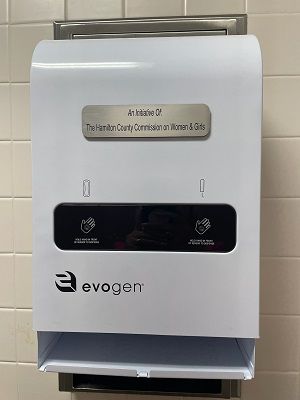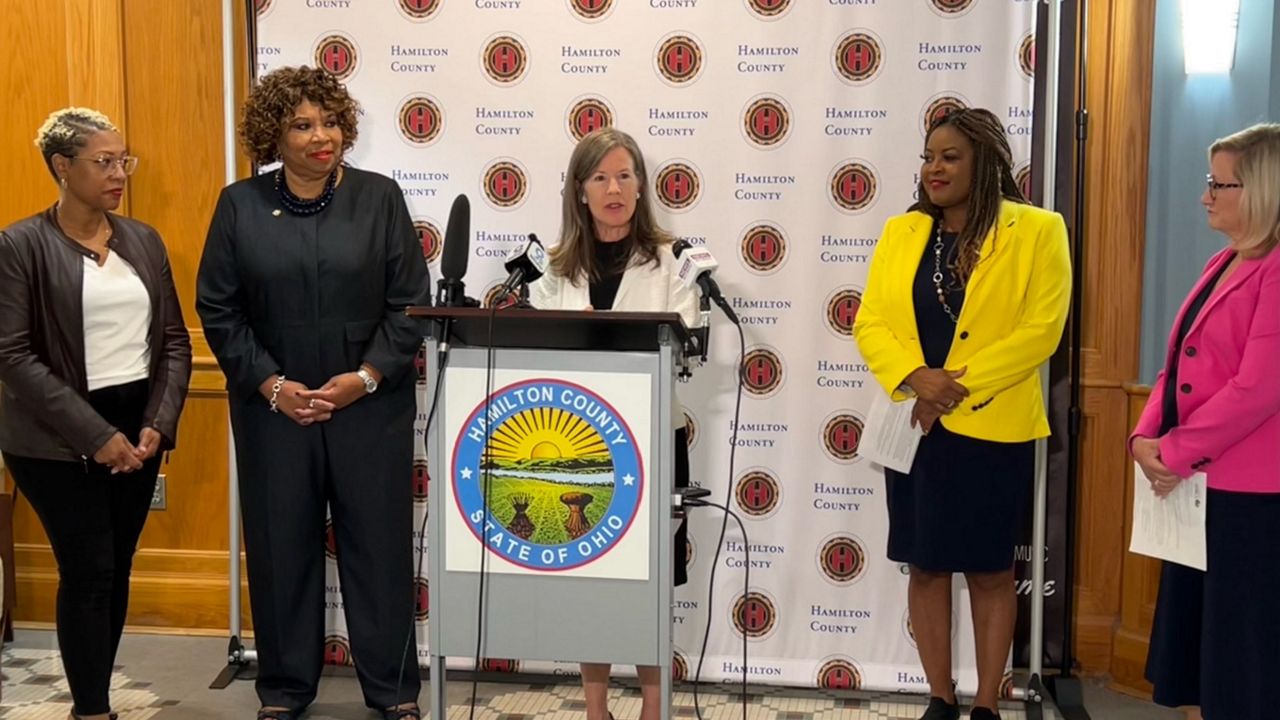CINCINNATI — Hamilton County has installed more than 70 no-cost period product dispensers in public restrooms at county-owned buildings as a “small but meaningful step” toward addressing systemic gender inequalities, according to Commissioner Denise Driehaus.
What You Need To Know
- Hamilton County installed 74 no-cost period product dispensers inside county-owned buildings
- The Hamilton County Commissioners, who approved the funding for the project, view this as an equity issue
- The cost of period products have gone 10% in the past year, and advocates for this program believe costs have led some people to go without this "necessity"
- The idea was born out of the Hamilton County Commission on Women and Girls, a board that makes recommendations to address gender inequalities
The products — tampons and pads — are free for employees but also members of the public.
The three Hamilton County Commissioners voted to support the installation of dispensers at county buildings ranging from the county administration building to courthouse to Hamilton County Jobs and Family Services.

Driehaus called it an equity issue.
Data from the Alliance for Period Supplies shows 2 in 5 women struggle to purchase period products due to lack of income, while one-third of low-income women reported missing work, school or similar commitments because they didn’t have access to period supplies.
“We know that period poverty is real. When there is access to free period products, students stay in class longer and workers are more productive,” Driehaus said. “We need to go beyond the stigma and see period products for what they are — a basic necessity.”
The 74 no-cost period product dispensers are in gender-neutral and women’s bathrooms at the following locations:
Hamilton County Juvenile Court Youth Center
Hamilton County Public Health Department
Times-Star Building (800 Broadway)
Hamilton County Job and Family Services, Alms and Doepke Building
Hamilton County Courthouse
Hamilton County Justice Center
Todd B. Portune Center for County Government
William Howard Taft Center
Hamilton County Communications Center (911 Dispatch)
Sheriff Patrol headquarters
Hamilton County Coroner’s Office and Crime Lab
The county purchased 110 of the dispensers from a local small business. Other county agencies can request one of the remaining dispensers.
The initial cost of the dispensers and period products was $25,190, Bridget Doherty, a county spokesperson, said. Moving forward, the county plans to roll the cost of the tampons and pads into the budget line item for toilet paper.
That’s the approach promoted by Free the Tampons, a Columbus, Ohio-based advocacy group.
The nonprofit published a report showing that 86% of women have started their periods while in public and without access to menstrual hygiene supplies. The data showed 79% of women polled stated they had to resort to creating makeshift substitutes for menstrual supplies out of toilet paper or similar items available in restrooms.
“We never question offering free toilet paper and soap in public restrooms,” added Commission President Stephanie Summerow Dumas. “Why would we not offer the same essential access to basic hygiene products like tampons and pads?”
The idea for the dispensers came from the Hamilton County Commission on Women and Girls. Its membership is 20 adults and 10 high school students appointed by the Board of Commissioners. It’s their job to make recommendations to the board for how to eliminate any distinction, exclusion or restriction made based on sex.
Driehaus founded the commission back in 2017. Since then, the group has worked on a variety of projects — ranging from health care to hiring practices. The commission also worked on the successful repeal of the so-called “Pink Tax” in Ohio that took effect in 2020.
“The Commission on Women and Girls is excited to see this initiative come to fruition and proud of Hamilton County for leading by example,” said Mary Maune, the program’s coordinator.
Providing no-cost period products has been one of the group’s top priorities for the past few years, Maune said, because the cost of period products is “exorbitantly high.”
The average cost of tampons has risen nearly 10% in the past year, the Washington Post reported in June.
Federal assistance programs like WIC and SNAP don’t cover the cost of tampons and other period products. They also don’t cover the costs of diapers, which are also more expensive right now because of inflation, Maune said.
“If you’re already struggling to buy food for your family or to pay rent, something like period products may feel like a luxury item that you just can’t afford,” she added. “But these aren’t luxuries or nice things to have. These are necessities. We wanted to make sure people in need have access to them.”
In April, the Commission on Women and Girls hosted what Maune called a Pay Equity Commitment “signing day.” The event called on local employers to sign a voluntary pledge to do their part to close gender- and race-based pay gaps.
The commission is taking a similar approach with this issue, Maune said, by asking schools, businesses and places where people gather to follow the county’s lead by supplying free period products.
MadTree Brewing heard what Hamilton County was doing and followed suit, Maune said. She said Cincinnati-based beer-maker has already installed dispensers at its brewery and Alcove, the restaurant it operates in Over-the-Rhine.
“We really use today as a launching pad and the start of conversation about doing more to show support to show support for women and menstruators in our communities,” Maune added.



